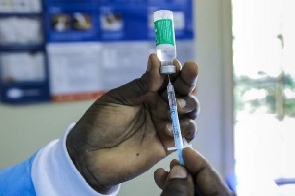Nana Kofi Adu-Nsiah, Executive Director of the Wildlife Division of the Forestry Commission, has underscored the need for Ghanaians to help raise awareness about the critical role wetlands play in sustaining the country’s freshwater resources.
This, he said, will enable the nation to take care of its future.
Nana Adu-Nsiah’s call is contained in a statement to mark this year’s World Wetlands Day, which falls on Monday, February 2, the date of the adoption of the Convention on Wetlands on February 2, 1971 in the Iranian city of Ramsar.
He observed that with proper management and care, the connection between wetlands and water can be sustained, to contribute to Ghana’s natural wealth, economic growth and development.
He recalled that since 1997, the Ramsar Convention Secretariat has, each year, encouraged and supported government agencies, non-governmental organizations, conservation organizations, and groups of citizens, to raise public awareness about the importance and value of wetlands.
Nana Adu-Nsiah explained that this year’s theme:’Wetlands For Our Future,’ focuses on teens and young people, as they are our future, and also draws attention to the urgent need for actions that wil slow, stop, and reverse wetland degradation.
Providing statistics, he said global estimates indicate that 64 per cent of wetlands have been lost in the last century, adding that population of freshwater species have declined by 76 per cent in the last 40 years, according to the Living Planet Index by the World Wide Fund for Nature.
‘We must reverse that trend so as to secure the future of our wetlands, as we cannot achieve sustainable development without healthy wetlands,’ he pointed out.
Nana Adu-Nsiah said even though we do not have figures or data for Ghana on wetlands loss and degradation, but a cursory look around tells it all-‘serious degradation and wetland loss form uncontrolled activities, the worst of it all these days is illegal mining, popularly called galamsey.’
Touching on the importance of wetlands, Nana Adu-Nsiah said they are extremely valuable to society, because wetlands provide water in quantity and quality, food and fisheries resources, reduce the impact of flooding, remove pollutants from water, recharge groundwater, protect shorelines, provide habitat for wildlife, serve as important recreational and cultural sites.
He said it is estimated that the aggregate value of services generated by wetlands throughout the world is 4.9 trillion dollars per year, and therefore pointed out that if wetlands are lost, the cost of replacing them can be extremely expensive, if at all possible.
‘Degraded wetlands can result in a country having to invest more money in drinking water treatment, and in hydro energy supply. The cost is even higher if we quantify the loss in terms of the goods and services wetlands provide to us.’
Nana Adu-Nsiah regretted that in Ghana, we continue to harbor wrong perception about wetlands as being wastelands and obstacles to many forms of development.
He said we do illegal mining in wetland areas, drain and reclaim our wetlands to facilitate other inappropriate uses, degrade wetlands by discharging toxix industrial and untreated wastes into our waterways, exploit wetland resources through unsustainable harvesting of fisheries, encroach on wetlands, even if they are under statutory reservations such as Ramsar Sites, or preserved as buffer zones for water supply impoundments as we see around most dams in the country.
‘We forget that in the absence of wetlands we lose our freshwaters, which are our source of water, and to a large extent hydro energy supply.
For example, the recent lowering of water levels in Akosombo, Kpong and the Bui dams, has been cited as one of the major causes of reduced electricity power supply in the country.
We have forgotten that over the years, our actions have impacted negatively on our wetlands that retain and maintain freshwater inflows in the rivers and streams that feed these dams,’ Nana Adu-Nsiah pointed out.
Regional News of Monday, 2 February 2015
Source: GNA
‘Let’s raise awareness about wetlands’ in sustaining our freshwaters’
Entertainment











